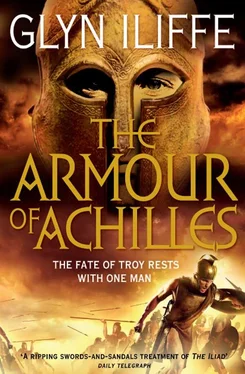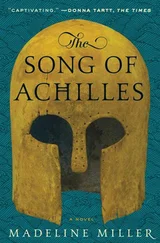Glyn Iliffe - The Armour of Achilles
Здесь есть возможность читать онлайн «Glyn Iliffe - The Armour of Achilles» весь текст электронной книги совершенно бесплатно (целиком полную версию без сокращений). В некоторых случаях можно слушать аудио, скачать через торрент в формате fb2 и присутствует краткое содержание. Год выпуска: 0101, ISBN: 0101, Издательство: Pan Books, Жанр: Старинная литература, на английском языке. Описание произведения, (предисловие) а так же отзывы посетителей доступны на портале библиотеки ЛибКат.
- Название:The Armour of Achilles
- Автор:
- Издательство:Pan Books
- Жанр:
- Год:0101
- ISBN:9781447205098
- Рейтинг книги:4 / 5. Голосов: 1
-
Избранное:Добавить в избранное
- Отзывы:
-
Ваша оценка:
- 80
- 1
- 2
- 3
- 4
- 5
The Armour of Achilles: краткое содержание, описание и аннотация
Предлагаем к чтению аннотацию, описание, краткое содержание или предисловие (зависит от того, что написал сам автор книги «The Armour of Achilles»). Если вы не нашли необходимую информацию о книге — напишите в комментариях, мы постараемся отыскать её.
The Armour of Achilles — читать онлайн бесплатно полную книгу (весь текст) целиком
Ниже представлен текст книги, разбитый по страницам. Система сохранения места последней прочитанной страницы, позволяет с удобством читать онлайн бесплатно книгу «The Armour of Achilles», без необходимости каждый раз заново искать на чём Вы остановились. Поставьте закладку, и сможете в любой момент перейти на страницу, на которой закончили чтение.
Интервал:
Закладка:
Chapter Three
T HE T EMPLE OF A RTEMIS
For a moment Eperitus was aware of nothing but the face of his father watching him. The spears, stones and arrows that were sending men to their deaths on both sides of the struggle were no longer a concern. The clash of weapons and the screams of men faded from his hearing, just as the figures moving all around him and on the walls above became colourless blurs, like shadows in a dream. Now all that mattered was the face on the ramparts, the closeness of the man who had haunted his nightmares for two decades, whose death he had wanted for so long that the desire to kill him seemed to have tormented his thoughts for ever. And now, after ten years of searching for his father across the battlefields of Ilium, he was suddenly and unexpectedly a spear’s cast away. All he needed to do was pull back his arm and hurl his weapon and all the hatred and shame would end.
And yet he was unable to move. For the first time in many years he felt afraid. It was not the churning of his stomach before every battle, which soon disappeared after the first arrow was fired or the first spear was thrown; it was the fear of confronting something so integral to his existence for so many years that in destroying it he might destroy himself. Who would he be if his father was gone? Apheidas had murdered his own king to usurp the throne, and when Eperitus had refused to join him he had sent his son into exile. The shame of that treachery was the driving force behind Eperitus’s desire for honour and glory; his anger at his father’s terrible acts gave him his ferocity in battle; and the knowledge that the old traitor had given his service to Troy kept Eperitus’s own loyalty to Greece focused and sharp. Indeed, Apheidas made Eperitus what he was.
He looked up at the battlements and into the dark eyes that had controlled him for so long, and despite the fear and the doubt that were tearing at his insides he knew he must kill his father. It was the only way he could be free to discover his own self, to move on from his dark past and become whatever the gods had intended him to be. With heavy limbs he drew back his spear and threw it at the crowd of defenders on the walls above. The black shaft seemed to quiver as it flew straight at its target. For an unbelievable moment Eperitus thought it would strike home, then Apheidas leaned to one side and the bronze head thumped into the chest of a Lycian archer behind him. It tore through the man’s tunic of layered cloth, split open his heart and came out through his back, just below the shoulder bone. As he fell, one of his comrades stepped forward and aimed an arrow directly at Eperitus, but before he could release it Apheidas grabbed him by his shoulders and threw him from the walls, to be hacked to death by the attackers below.
With his spear cast, Eperitus felt the heaviness lift from his limbs and the old anger return. He drew his sword and barged through the ranks of soldiers who stood between him and the walls. Leaping into the ditch, he ran to one of the ladders and pulled aside a pale-faced soldier who was about to mount. A large stone thumped into the earth beside him and arrows whistled past his ears, but he raised his grandfather’s heavy shield over his head and began to climb.
The rungs were slippery with blood and his progress was awkward without the full use of his hands, but as more stones bounced off his shield and the points of half a dozen arrows nudged through the four-fold leather he felt no fear, only an iron-like determination to reach the top and get among the defenders. On either side of him as he ascended he could see the length of the ditch filled with the dead and the living. Doubled ladders lashed together with belts were being raised at every point now and under the cover of the Locrian archers hundreds of men were renewing the attack on the walls.
‘Eperitus!’ boomed a voice from a neighbouring ladder.
It was Polites.
‘Where’s Odysseus?’ Eperitus shouted back.
Polites shrugged and pointed to the battlements above, before resuming his ascent in silence. Eperitus looked up from beneath his shield and saw the parapet just ahead of him. As he watched, a pair of hands seized the top of the ladder and tried to push it sideways. The flimsy structure wobbled and Eperitus’s body tensed as he struggled to keep his balance, but a moment later he heard a scream and a body fell past him to the ditch below. The ladder straightened again and he quickened his ascent, steadying himself with his sword hand on the rungs before his face. As he reached the top a spear point jabbed through his cloak and scraped across the back of his leather cuirass. Eperitus hooked his shield over the parapet and instinctively lashed out with his sword. The obsessively sharpened edge found flesh and bone and a bitter cry of pain followed; his attacker’s spear fell down to the ditch below, a severed hand still gripping the shaft.
Climbing up on to the top of the wall, he found himself looking down at a dozen dark-skinned, bearded faces, eyes wide with fear and exhilaration and the knowledge that death was close. He kicked out at the nearest and sent him sprawling backwards, then jumped down among the others and buried his sword in the chest of a young spearman, killing him instantly. He tugged his weapon free and advanced. An archer tossed his bow aside and drew his short sword against the fearsome Ithacan, only to have his arm lopped off above the elbow. Eperitus barged him aside with his shield and – sensing that more Ithacans were jumping down on to the wall behind him – pushed forward into the mass of Lycians and Dardanians, all the time scanning for signs of his father.
By now the walls were crowded with men from both sides, jostling against each other in a struggle for mastery. As Eperitus sent another opponent tumbling from the battlements with a heave of his shield, he noticed for the first time the collection of simple, flat-roofed dwellings that both sides were fighting to possess: a homogenous sprawl of dusty houses, brightened here and there by the broader structure of a temple or by an open market square, but otherwise unremarkable and not worth the blood of so many brave men. Then he caught the flash of a bronze-scaled breastplate out of the corner of his eye and turned to see a Lycian noble pushing forward through his men. He carried the tall shield favoured by most high-born Trojans and wielded a huge, double-headed axe, which he swung at Eperitus’s head. Eperitus dodged the blow and punched out with his shield, knocking his attacker back into the press of his men.
‘Where’s Apheidas?’ he demanded, speaking in his opponent’s language.
‘Damn Apheidas! Fight me !’ the noble responded angrily, the spittle flecking his beard.
He sprang forward, cleaving the air with his axe. Eperitus ducked aside and lunged with his sword, forcing the Lycian to fall back and draw his shield across his body.
‘Tell me where Apheidas is and I’ll let you live.’
The Lycian laughed and brought his heavy axe down in another attack. The edge sparked against the stone parapet as Eperitus avoided the blow with easy agility. A moment later the point of the Greek’s sword found the Lycian’s groin and he crumpled to his knees, clutching at the wound in a vain effort to stop his lifeblood pouring out of his body. Eperitus kicked him to the stone floor of the battlements and placed his blade against the man’s neck.
‘I can kill you now or leave you to a slow death. Where’s Apheidas?’
The man looked up at him with pain-filled eyes, his warrior’s pride replaced by the humbling certainty that death was near.
‘He went back down into the city,’ the Lycian whispered through gritted teeth. ‘Now keep your promise and send me to Hades.’
Читать дальшеИнтервал:
Закладка:
Похожие книги на «The Armour of Achilles»
Представляем Вашему вниманию похожие книги на «The Armour of Achilles» списком для выбора. Мы отобрали схожую по названию и смыслу литературу в надежде предоставить читателям больше вариантов отыскать новые, интересные, ещё непрочитанные произведения.
Обсуждение, отзывы о книге «The Armour of Achilles» и просто собственные мнения читателей. Оставьте ваши комментарии, напишите, что Вы думаете о произведении, его смысле или главных героях. Укажите что конкретно понравилось, а что нет, и почему Вы так считаете.












